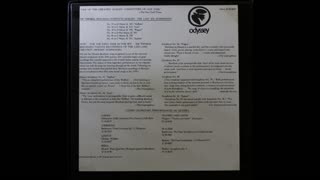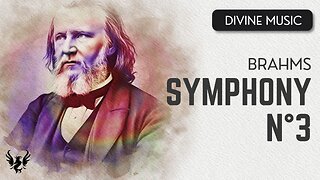Berlioz - Symphonie Fantastique | Herbert von Karajan (Orchestre de Paris 1970)
Berlioz - Symphonie Fantastique, Op.14
Orchestre de Paris
Conducted by Herbert von Karajan
Filmed in Paris, June 25 1970
Director Roger Benamou
Symphonie fantastique: Épisode de la vie d'un artiste … en cinq parties (Fantastical Symphony: Episode in the Life of an Artist … in Five Sections) Op. 14, is a program symphony written by the French composer Hector Berlioz in 1830. It is an important piece of the early Romantic period. The first performance was at the Paris Conservatoire on 5 December 1830. Franz Liszt made a piano transcription of the symphony in 1833 (S. 470).
Symphonie fantastique is a piece of program music that tells the story of a gifted artist who, in the depths of hopelessness and despair because of his unrequited love for a woman, has poisoned himself with opium. The piece tells the story of the artist’s drug-fueled hallucinations, beginning with a ball and a scene in a field and ending with a march to the scaffold and a satanic dream. The artist’s lust is represented by an elusive theme called the idée fixe — the object of fixation.
After attending a performance of William Shakespeare's Hamlet on 11 September 1827, Berlioz fell in love with Irish actress Harriet Smithson, who played the role of Ophelia. He sent her numerous love letters, all of which were unanswered. When she left Paris in 1829, they had still not met. Berlioz wrote Symphonie fantastique as a way to express his obsession. Smithson did not attend the premiere in 1830, but she heard the work in 1832 and realized the piece was about her. Berlioz began to court Smithson and later manipulated her into marriage by swallowing a lethal dose of opium in front of her. Hysterical, she accepted the proposal, upon which Berlioz produced a vial of antidote from his other pocket. The two were married in 1833 and eventually separated.
The symphony has five movements, instead of four as was conventional for symphonies of the time:
I. "Rêveries – Passions" (Daydreams – Passions) – C minor/C major
II. "Un bal" (A Ball) – A major
III. "Scène aux champs" (Scene in the Fields) – F major
IV. "Marche au supplice" (March to the Scaffold) – G minor
V. "Songe d'une nuit du sabbat" (Dream of a Witches' Sabbath) – C minor/C major
-
 5:01
5:01
EdwardSchaffer
3 years agoSymphony 98, Op 391, Music of the Spheres, II Harmonia de terra
28 -
 8:21
8:21
EdwardSchaffer
3 years agoSymphony 98, Op 391, Music of the Spheres, III Harmonia de martis
14 -
 23:56
23:56
Classical Music P.D.
1 year agoClarinet Sonata No.1, Op.120 - Brahms 'Richard Stoltzman - Clarinet, David Deveau Piano'
20 -
 38:54
38:54
Classical music_Music Inspiration
1 year agoJohannes Brahms Symphony №4 in E minor, Op.98
7 -
 24:46
24:46
Mark's Music Collection - Classical
3 years ago $0.19 earnedMozart - Symphony No 38 in D Major "Prague" K.504 - Sir Thomas Beecham, Royal Philharmonic
378 -
 1:50
1:50
Surn's AI Music
7 months agoAI Orchestral Symphany
1 -
 6:26
6:26
EdwardSchaffer
3 years ago $0.01 earnedSymphony 98, Op 391, Music of the Spheres, I Harmonia de luna
21 -
 49:13
49:13
Classical Music P.D.
1 year agoSymphony No.1 in C minor, Op.68 - Johannes Brahms 'Barbara Schubert' 'Live performance 2006'
9 -
 6:20
6:20
Gnostic Library
7 months ago💥 JOHANNES BRAHMS ❯ Symphony No. 3 in F Major ❯ 432 Hz 🎶
26 -
 54:32
54:32
Burkholder Media Classical Music
3 years ago $0.01 earnedSymphony no. 8 in C major 'the Great', D. 944__Franz Schubert
631